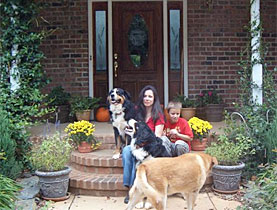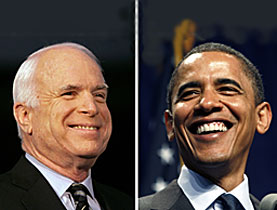Key role seen for evangelicals in US election

Evangelicals, some of them with Swiss roots, are set to play a key role in the forthcoming United States presidential election.
While they represent a quarter of the US electorate and gave massive support to George Bush when he was twice elected, they are not such a united community today.
Esther Payne and Michelle Lloyd-Paige have one thing in common. These two Americans consider themselves evangelicals and attach a great importance in their lives to the Bible. But on November 4, they will vote for different candidates in the US presidential election.
Payne, who came from Basel in 1986 and lives with her American husband in Lancaster, North Carolina, will vote for the Republican, John McCain. Lloyd-Paige, a pastor in Grand Rapids, Michigan, will vote for the Democrat, Barack Obama.
“I like John McCain very much as a person, I also appreciate his experience and his ability to reach across the aisle,” Payne told swissinfo. I found Obama to be very far to the left and also he dos not have enough experience”
“I will vote for Obama because the Bush years have not been so good” said Lloyd-Paige. “For me, the fact that Obama is black is the icing on the cake but it’s not the main reason I’m supporting him.”
Up until now, the evangelicals opted so massively for the Republicans that American political scientists spoke of an “evangelical vote”. Over the past eight years, the evangelicals gave their support to Bush no matter what happened.
Despite the growing unpopularity of the war in Iraq and the president, their votes for Bush increased in 2004 from 2000.
Less united
However, if nearly 80 per cent voted of evangelicals voted for Bush four years ago, their community is less united today. Only 40 per cent of those under 30 identify with the Republican cause compared with 55 per cent in 2005.
Even if the majority of evangelicals who leave the Republican Party do not go so far as to join the Democrats, they are not necessarily off limits for a candidate like Obama.
And even though young evangelicals might take a tougher stance than their elders against abortion, they are more preoccupied than them with fighting against poverty and protecting the environment.
It is not only those under 30 who have been distancing themselves from the Republican Party.
“I think it’s good that McCain does not campaign with Bush because he will definitely bring a new direction to the White House,” Payne, who is 44, said.
“Against the lobbyists”
“It is very important that politicians make decisions for the good of the country, not only for the good of special interests and I think that McCain wants to work harder against the lobbyists and against big government.”
Evangelical leaders are also less united than before, with the old guard slowly giving their places to more open pastors. Jerry Falwell died last year and Billy Graham is almost 90.
The excesses of Pat Robertson have annoyed some. As a result other people have emerged, like Rick Warren – who last month invited McCain and Obama to his church in California for a televised forum – James Dobson, who said he would not vote for McCain, and Richard Cizik, a vice-president of the National Association of Evangelicals, who came close to the Democrats on issues includint the environment, the death penalty and Iraq.
There are also a good number of evangelicals who deplore the fact that their movement has been caricatured.
“The voices that have been picked up by the media are the most extreme and that has hurt the evangelical movement,” Lloyd-Paige said.
More conservative
Stephen Momsa, an evangelical researcher at Calvin College who will vote for Obama after having supported Bush in 2000, notes that the evangelical movement was first associated with causes defended by the American left, in particular the abolition of slavery, and it was only in the 1950s that it became more conservative politically.
Many evangelicals are also very unhappy that their movement has become too political.
Evangelicals have learned that it’s not our duty to be too exposed with the power structure,” said Hans Moser, a Bernese with double nationality. “Being evangelical is something spiritual, it’s not something that should be thrown to the swine.”
Moser, who left the Republican Party last year and who has described McCain as a “bad candidate” will nonetheless vote for him with more enthusiasm than he thought, and the reason is Sarah Palin.
McCain, who is not fond of talking about religion, chose Palin as his running mate; she belongs to the Pentecostal church.
“Her presence with McCain shows that he means to have us engaged. McCain has now a pretty good chance of victory,” Moser believes.
According to opinion polls, the majority of evangelicals are, like Moser, prepared to vote once more in favour of a Republic candidate for the White House.
“There is a new spirit, a more progressive mood in the evangelical community, I see it in the evangelical colleges, I see it with our new pastors, but this new trend is at an early stage,” Momsa said.
swissinfo, based on a text in French by Marie-Christine Bonzom, Washington
The term evangelical applies to beliefs that can vary from one person to another, from one community to another, and from country to country.
However, they basically imply the authority of the Bible, the historical veracity of the scriptures, Christ’s salvation, the importance of personal transformation and evangelisation.
For Esther Payne from Switzerland, the word means “wanting to follow the example of Jesus Christ, attach importance to the value of human life, and not go to church to have a religious system that simply makes you feel good”.
For Michelle Lloyd-Paige, it means “being a disciple of Jesus Christ, understanding that I was born again in my life and bearing in mind that Jesus Christ came to change society and not just the individual”.
Evangelicals represent 26.3 per cent of the electorate in the US, or about 40 million people.
McCain has 71 per cent of the voting intentions of evangelicals, compared with 21 per cent for Obama.
In Switzerland, there are more than 1,500 evangelical churches and communities.
There are about 200,000 evangelists in Switzerland, or about 3% of the population.

In compliance with the JTI standards
More: SWI swissinfo.ch certified by the Journalism Trust Initiative










You can find an overview of ongoing debates with our journalists here . Please join us!
If you want to start a conversation about a topic raised in this article or want to report factual errors, email us at english@swissinfo.ch.